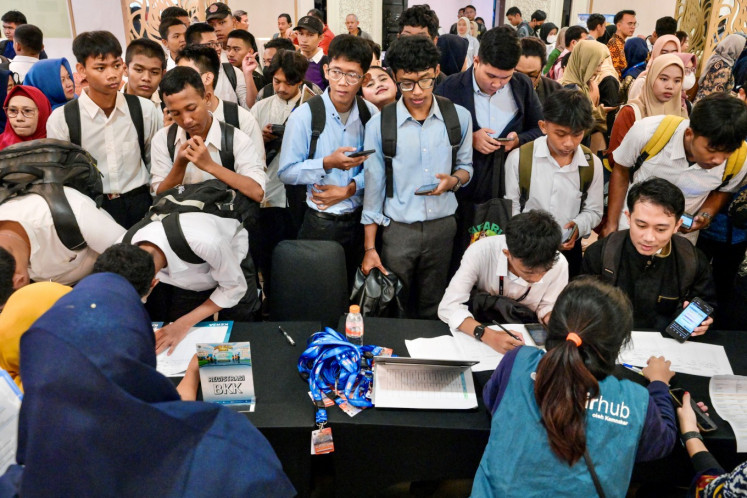Popular Reads
Top Results
Can't find what you're looking for?
View all search resultsPopular Reads
Top Results
Can't find what you're looking for?
View all search resultsPurbaya’s thankless task
Change text size
Gift Premium Articles
to Anyone
P
urbaya Yudhi Sadewa begins his job as the country’s new finance minister at a tough moment, as the 2026 budget plan comes with lots of open questions but little time to find the answers.
He will find on his desk a draft that is already in deliberation between the government and the House of Representatives and leaves limited room for maneuver, because large chunks are reserved for flagship programs dear to President Prabowo Subianto, such as those to provide free meals and build or renovate 3 million homes per year.
To fund these, the plan is to ramp up tax revenue by 13.5 percent in 2026 from this year’s projected income, but without hiking tax rates, which Purbaya’s predecessor Sri Mulyani Indrawati has called “ambitious”.
At the same time, the fiscal deficit is to be pushed down to 2.48 percent of gross domestic product from an expected 2.78 percent in 2025. To make those pieces fit together, GDP growth needs to accelerate substantially, while inflation must remain low.
That sounds like a set of key performance indicators that would set any new finance minister up for failure, but Purbaya is putting on a brave face.
Within hours of assuming office, he vowed to accelerate state spending to propel economic growth and warned that failure to do so would “strangle the economy” and cause Prabowo’s administration to fare worse than the previous two presidents.
Furthermore, he has proposed moving Rp 200 trillion (US$12.13 billion) of state savings from the central bank to commercial lenders to increase loan disbursement with the explicit goal of more private sector activity.
That mention of the private sector should come as a relief to businesspeople and investors concerned that an overbearing public sector could discourage private enterprise.
Both of those ideas come with risks and opportunities, but changing nothing entails its own risks, so we owe the new minister the benefit of the doubt.
He clearly has enormous shoes to fill as a replacement for Sri Mulyani, a veteran finance minister with immense experience earned in government and in global financial institutions.
Thanks to her international reputation of fiscal prudence, Sri Mulyani was seen as a figure that lent credibility to Indonesian bond offerings in the global market.
Purbaya lacks such a reputation, but coming straight from the Indonesia Deposit Insurance Corporation (LPS), he is arguably a technocrat rather than a politician, which is a positive.
He needs time to grow into the office, and he admitted as much in a slightly clumsy speech during the Finance Ministry handover ceremony.
That is understandable, and we should give him some time, even though we do not have much of it, because pressure is rising, as reflected in the protests and riots last month.
Purbaya, who is known for not mincing his words, has blamed fiscal and monetary policy mistakes for the widespread unrest as a result of an underperforming economy.
In a House hearing, he also described the budget absorption pace as “slow”. That is a well-known issue in Indonesia. Calling out a problem is one thing, but providing a solution is the harder part.
In some statements, Purbaya comes across as a know-it-all, which could be preferable to being a yes-man, as long as he is equally willing to speak his mind behind closed doors.
A finance minister, after all, is also an auditor of government policies, who must be both competent and confident enough to point out limits, even vis-à-vis the president, with regard to what can be done and what cannot, based on fiscal pressures and likely market reactions.
A president must have vision but also needs ministers around him or her who are willing to put a damper on plans that look unaffordable or may need scaling back.
Holding the middle ground between change and continuity in fiscal policymaking will be key to Purbaya’s success at the helm of the Finance Ministry, which is, or should be, at the center of domestic policymaking.
Best of luck, Pak Purbaya!











